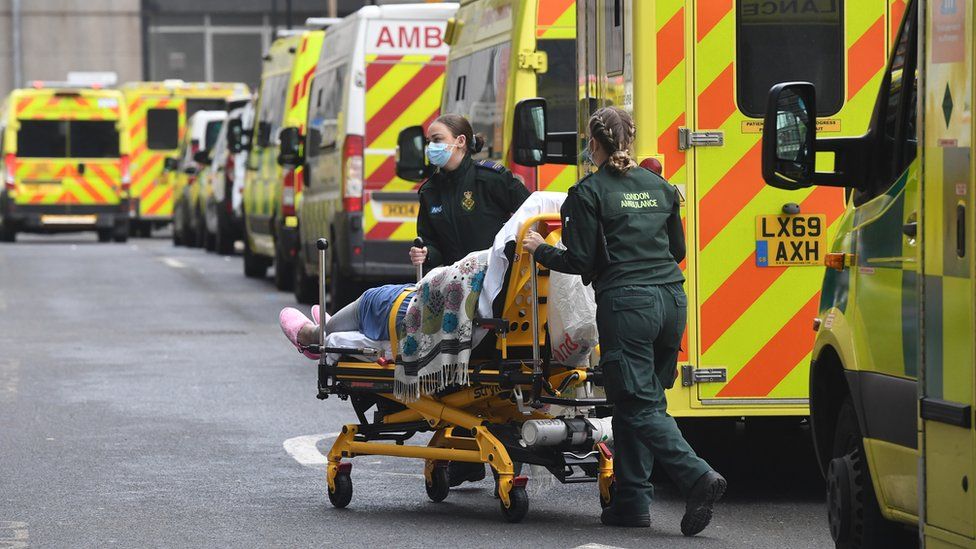Covid-19: Further 1,295 deaths recorded in the UK
- Published

A further 1,295 deaths within 28 days of a positive Covid test have been reported in the UK, the third-highest daily total since the pandemic began.
It brings the total number of deaths by this measure to 88,590.
There have also been a further 41,346 lab-confirmed cases, and 4,262 more people have been admitted to hospital.
Dr Yvonne Doyle, medical director for Public Health England, said the "continuous rise in cases and deaths should be a bitter warning for us all".
"We must not forget the basics," she added. "The lives of our friends and family depend on it.
"Keep your distance from others, wash your hands and wear a mask."
The latest figures come ahead of Monday's change in travel rules for the UK, with all travel corridors closing, meaning arrivals from every country will have to quarantine.
Prime Minister Boris Johnson announced the changes at Downing Street on Friday, saying they would "protect against the risk of as yet unidentified new strains" of Covid.
While daily figures can fluctuate due to delays in reporting, the seven-day average of Covid deaths in the UK has now risen slightly to 1,103.
For cases, however, there has been a drop in the seven-day average, with the figure now at 48,565.
There are currently 37,475 people in hospital with the virus, government figures show, while a further 324,233 people have received their first vaccine dose.
The government has promised all the over-70s, the extremely clinically vulnerable and front-line health and care workers - about 15 million people - will be offered a jab by mid February.
Currently, just over 3.5 million doses have been administered.
The government has also announced £120m in funds for the social care sector to be used by local authorities to increase staffing levels.
Staff absence rates have risen in care homes and among home care staff, due to them testing positive or having to self-isolate.
Health Secretary Matt Hancock said the money would bolster staffing numbers in a "controlled and safe way, whilst ensuring people continue to receive the highest quality of care".
A further £149m funding was announced in December to support rapid testing of care home staff.
Speaking alongside the PM on Friday, England's chief medical officer, Prof Chris Whitty, said the number of patients being admitted to hospital with coronavirus was set to peak within the next 10 days, while the peak for deaths was also yet to come.
He added, however, that he hoped the peak in infections had already happened in the South East, East and London, where there was a surge in the new, more transmissible variant.
"The peak of deaths I fear is in the future, the peak of hospitalisations in some parts of the country may be around about now and beginning to come off the very, very top," he said.
"Because people are sticking so well to the guidelines we do think the peaks are coming over the next week to 10 days for most places in terms of new people into hospital."
However, chief scientific adviser Sir Patrick Vallance stressed it was a "suppressed peak" that would "boil over for sure" if controls were eased.
He said: "This is not the natural peak that's going to come down on its own, it's coming down because of the measures that are in place.
"Take the lid off now and it's going to boil over for sure and we're going to end up with a big problem."
Meanwhile, on Saturday, Labour leader Sir Keir Starmer suggested he would back further coronavirus measures, as "the tougher the restrictions now the quicker we get the virus back under control".
Sir Keir said he was "still worried" by the number of infections, despite signs they are falling - and that the "sense that we are through the worst" of the third wave was wrong.
"Nobody likes restrictions but the tougher the restrictions now the quicker we get the virus back under control, the quicker we reduce the number of hospital admissions and the quicker we get that number of deaths, tragically, down," he added.
- RUPAUL'S DRAG RACE UK: Mama Ru's back with 12 fabulous drag queens. Who gets the crown?
- DEATH IN BOLLYWOOD: How did Jiah Khan die? For her British family, the truth about her death still hasn’t come out
Related Topics
- Published16 January 2021
- Published16 January 2021
- Published16 January 2021